Are Young Men Turning Right?
Another day, another viral eye-popping graph:
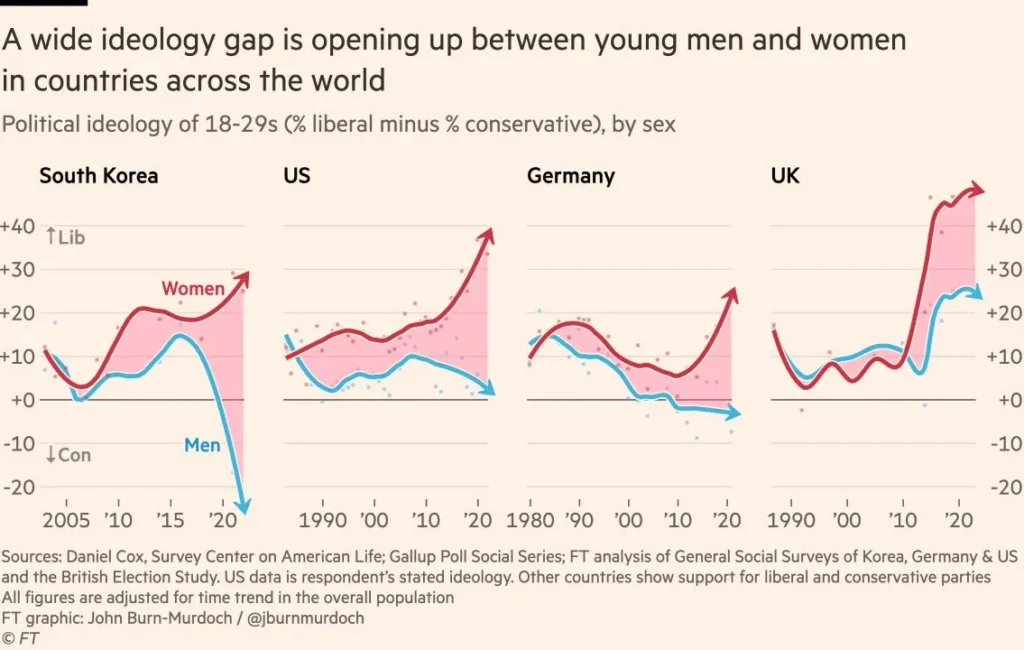
The trend among young women looks quite unambiguous. They are becoming more monolithic in their embrace of liberalism. For young men, the results are more mixed. We see an apparent sharp rightward swing in South Korea, a subtle shift back to an equilibrium state in America, a slight trend to the right in Germany which may have plateaued, and if anything the opposite trend in the UK with men following women but just to a less pronounced degree.
This hasn’t stopped media outlets, political commentators, etc. from predictably scaremongering by framing it as an uprising of radicalized Andrew Tate devotees.
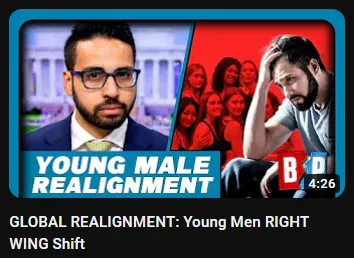

People are always eager to pounce on any opportunity to trot out their talking points surrounding ‘the state of young men’. We have failed men, how do we better appeal to these lost boys? They’re being radicalized by social media algorithms. It’s a backlash to the excesses of feminism. They’re angry incels gearing up for a rebellion, etc. Little to no thought was paid to the much more consistent trend among women, it was all about how men are supposedly flocking to the right in droves.
Is this the correct takeaway?
The FT graph states that for the US it employed data from the Gallup Poll and also the General Social Survey. Let us take a look at a couple of graphs showing data from the former which apparently the data from 1998 onward was taken from.
As the titles say, young women are becoming more liberal, however, there isn’t a clear trend when it comes to young men. The share identifying as liberal has remained relatively stable across the past two and a half decades. When it comes to the other positions, centrist chads still reign supreme. It doesn’t look like non-liberals are becoming any more conservative either.
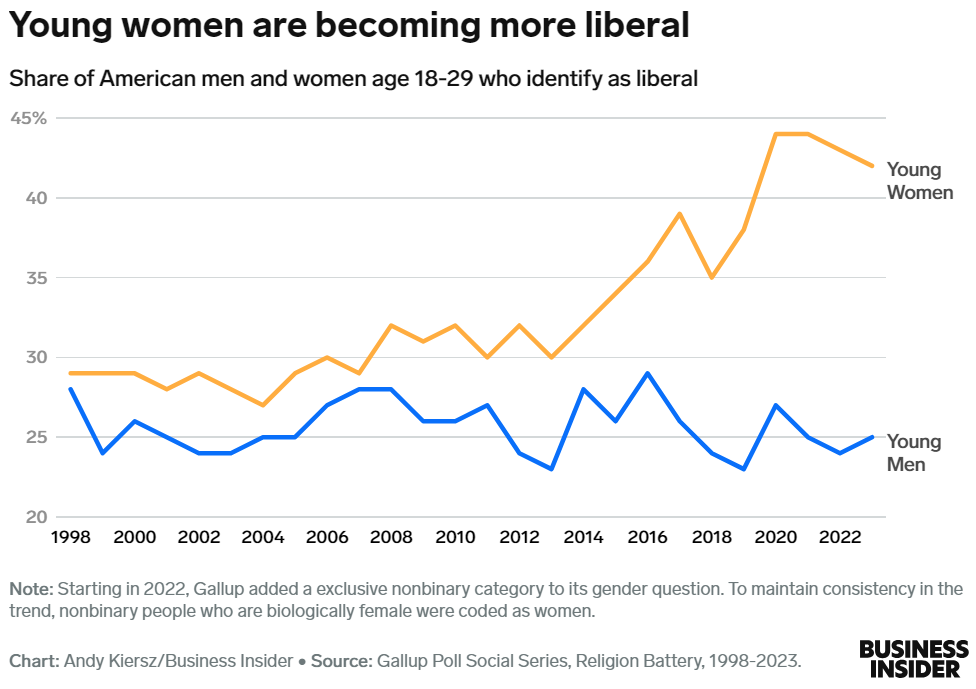
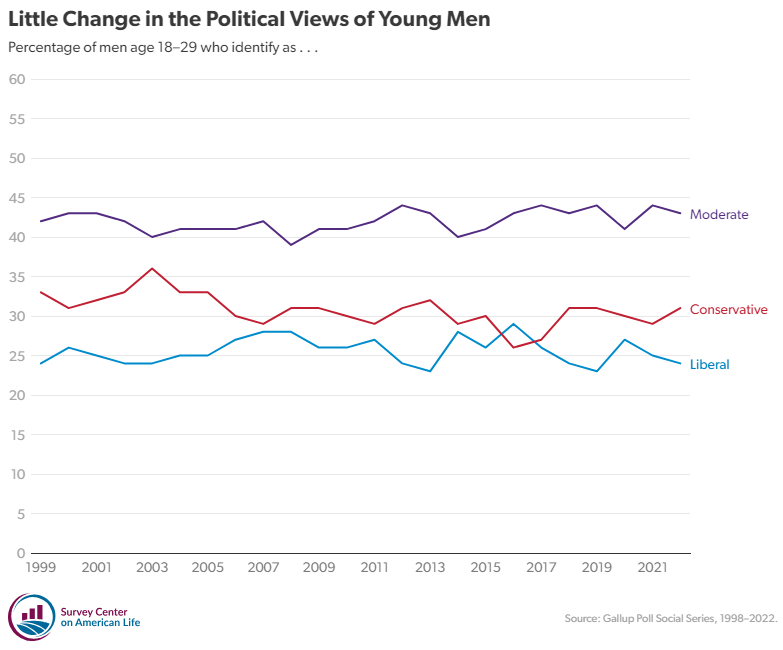
I had looked at General Social Survey data before this new graph blew up, and it likewise showed little change except for a peculiar spike in conservatism in the most recent survey of 2022.
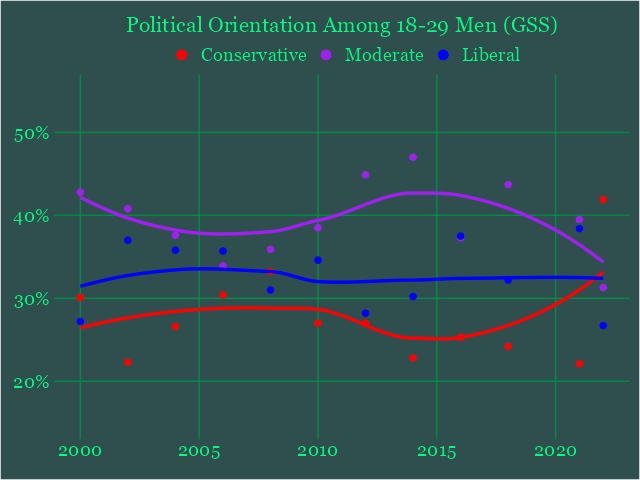
My initial suspicion was that it may be related to covid restrictions, but then realized that this would have showed up in the 2021 survey. As Allen Downey discovered, there is a sizeable discrepancy between the unweighted and weighted percentage beyond what is observed in other data points, so it could just be an artifact of weighting, although I’m not sure exactly what subset of the sample would be responsible. He also determined that there was no evidence that the gender gap was growing when omitting this anomalous data. It’s worth mentioning however that the unweighted sample size tends to be about 150-250 for 18-29 men in the GSS, while it apparently tends to be at least 1,000 in the Gallup polls.
I’m not sure exactly why the FT graph shows a surplus of liberals when apparently it portrays Gallup data which was ‘backfilled’ with GSS data in the years prior to the Gallup series beginning. If anything Gallup showed the opposite of this. It could be that as the footnote says the data was adjusted for trends in the overall population. I guess that might also explain the downward trend which isn’t observed in the Gallup data. As for why the GSS quite consistently shows an opposite pattern to Gallup with a liberal rather than conservative surplus, I couldn’t tell you.
Ryan Burge analyzed another dataset, the Cooperative Election Study, finding a lack of evidence for a widening gap, with young men following women quite closely in their liberalification. Despite this, there wasn’t a parallel trend in party affiliation, but the gap remained relatively stable. This survey boasts the most considerable sample size as well, from about 3,000 to 12,000 annually in the case of 18-29s.
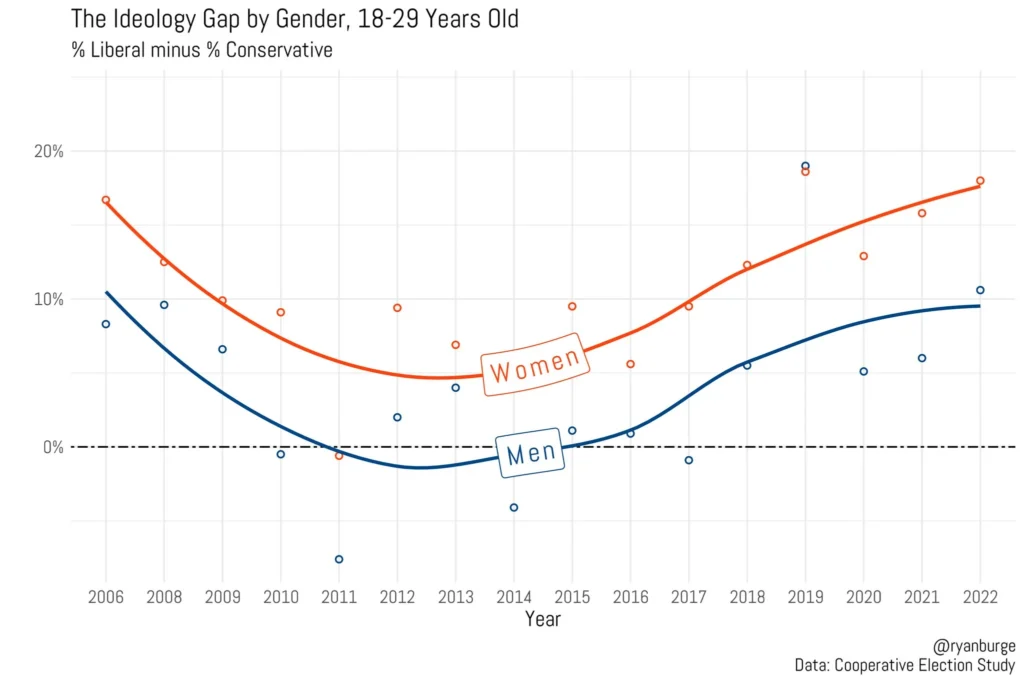
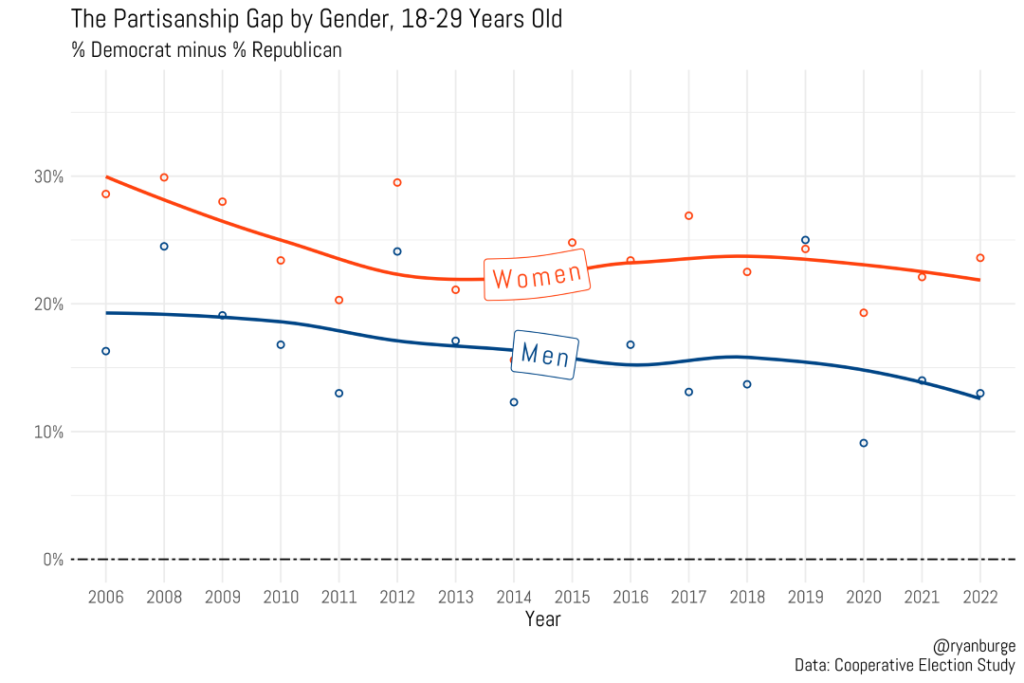
It’s possible that this trend is more readily apparent among the youngest part of the age bracket, so I narrowed it down to 18-20s. Since it’s such a large survey the sample sizes still remain quite good. There is at least tentative evidence for an emerging gap within this cohort across the last ten years or so, but 18-20 men were still slightly more liberal than conservative in recent surveys. A survey by the Survey Center on American Life likewise found the largest gap among Gen Z, as well as a racial interaction: while overall 43% of Gen Z women and 35% of Gen Z men identified as liberal, the gap was wider among white zoomers, with 46% of women and 28% of men identifying as liberal. I wasn’t able to replicate this in the CES however.
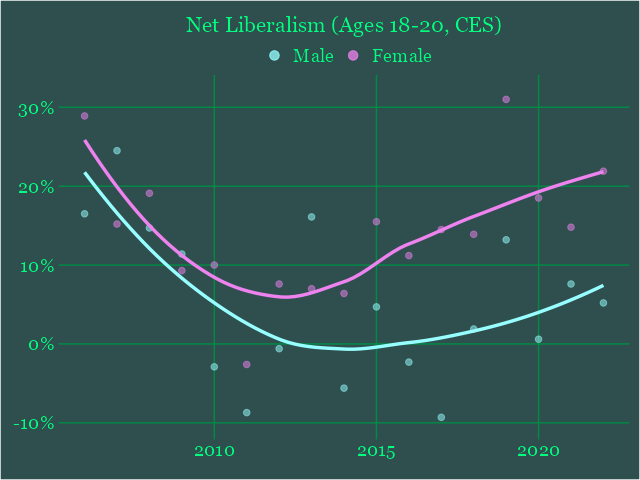
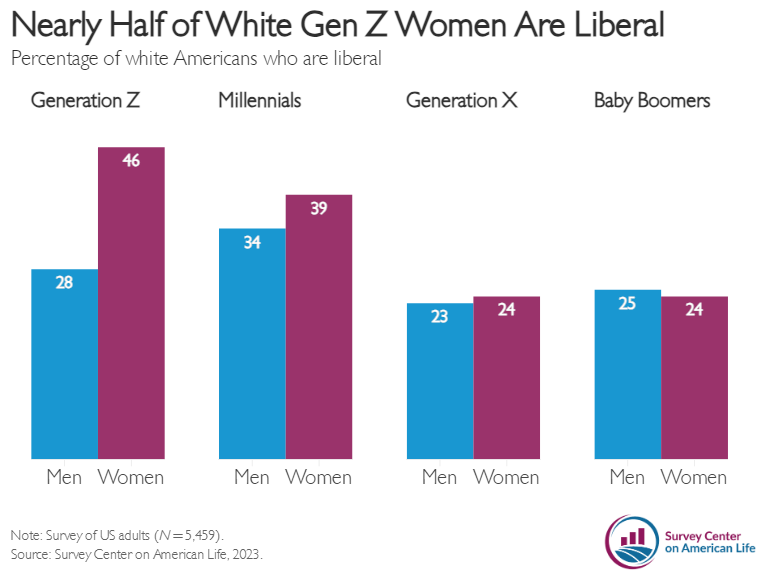
There was also that data from Monitoring the Future which went viral. It may seem to show a big change, but this may be slightly misleading as if we take a closer look at the Y-axis it has been truncated to 10-30%. The percentage of 12th grade boys identifying as conservative has only risen by a few percent since a decade before if we go by the latest data. They have also been abandoning liberalism though so it does look like there is a noticeable gap emerging. When it was a few percent at most in earlier years, it’s about 10% now. This likely reflects a real shift too as the sample size for the most recent survey was substantial at more than 4,000 boys.
In the case of girls, there seems to be the usual upward trend for liberalism, but not an equivalent drop in conservativism, so there must be more moderates or previously apolitical girls throwing their pussy hats in the ring.
It’s worth bearing in mind that the majority of both boys and girls were either apolitical or moderate. One might question how much do high-school students’ ‘political views’ actually matter, at that age they’re little more than a fashion statement. On the other hand you could argue this only makes it more meaningful, as they’re less interested in taxes and more what the two sides represent culturally. It’s not like most of the moral panic here is related to certain political policies being endorsed but more what these shifts say about gender relations, as feminism and the reaction to it are closely associated with one political side or the other.
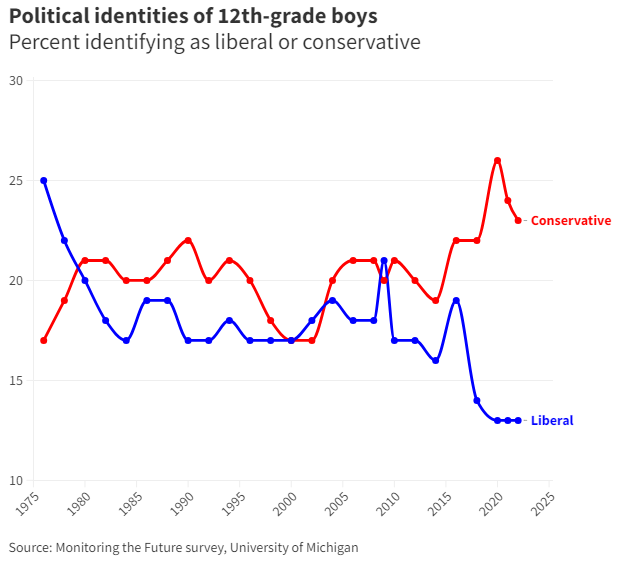
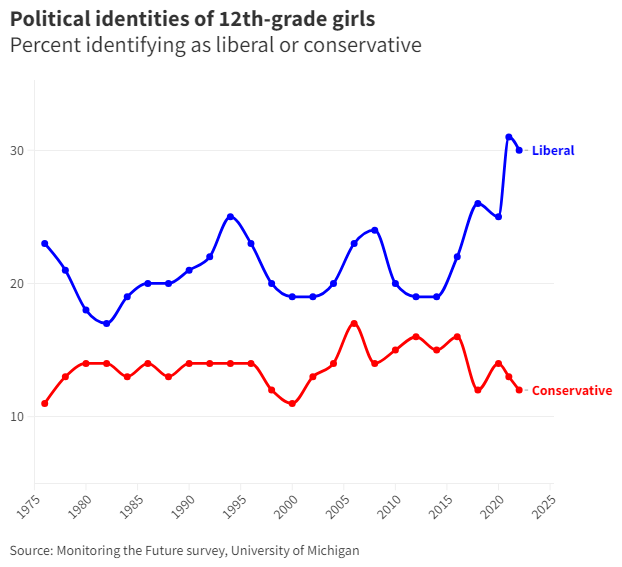
So how does all this play out at the polls? While there is perhaps some evidence for a growing gender gap, this is once again caused not by men but by women. There’s a valid question as to how well these parties act as proxies for liberalism or conservatism, but at least nowadays it seems like quite well, as Democrats have gone from an even split of people identifying as liberal or conservative in 1994 to 54% and 10% respectively. 72% of Republicans identify as conservative and 5% as liberal.
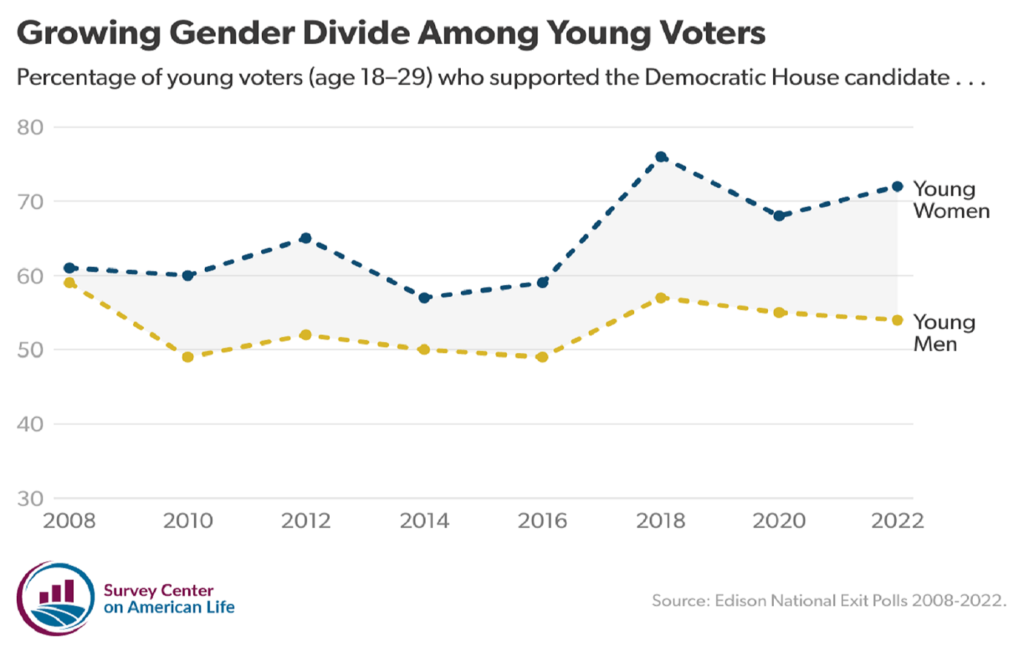
Views on gender issues
The general view is that this divergence represents a growing tension between the sexes. While there doesn’t seem to be evidence that young men in the US are becoming more conservative outside of perhaps the very youngest cohort, could this come through in their stated values regarding women’s role in society? The GSS asked if they agreed with the statement that “Most men are better suited emotionally for politics than are most women”. Young men seem as woke as ever on this topic at least.
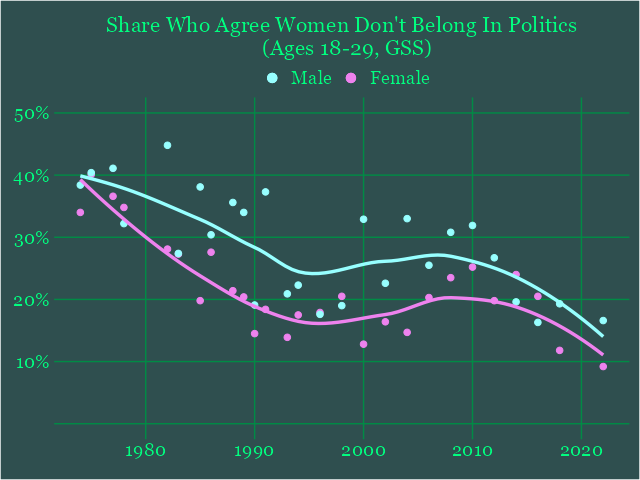
The Survey Center on American Life on the other hand found that Gen Z men had a rate of feminist identification equivalent to that of Gen X men, which is down from Millennials. It’s not a massive gap but the overall sample size was over 5,000 so it’s probably statistically significant. Gen Z women on the other hand have gone in the other direction, leading to the widest gap across the generations. Since Gen Z women are more feminist than any other generation but Gen Z men are simply less feminist than Millennials however, I’d say it’s still more of a case of young women being especially liberal rather than young men being especially conservative. It doesn’t mean they’re anti-feminists necessarily either, they might just not care very much either way.
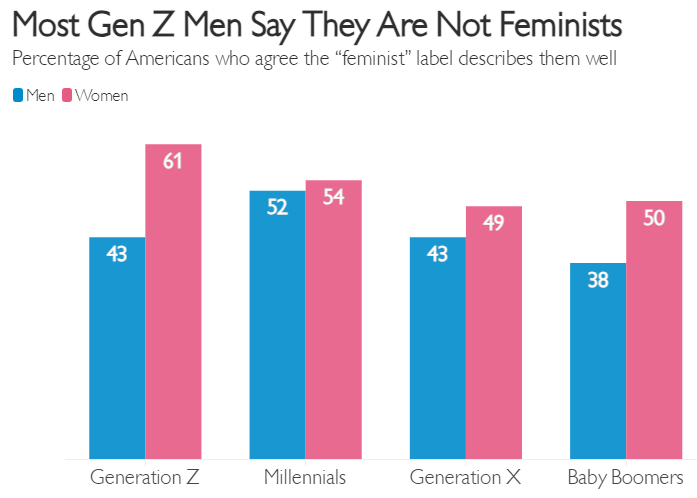
Similarly, the 2023 State of American Men survey found that Gen Z men were less likely than men in the older age cohorts to agree that feminism had made America a better place. Them and Zillennials were slightly more likely to agree than men have it harder than women and to say they were worried about a partner accusing them of abuse after a sexual encounter.
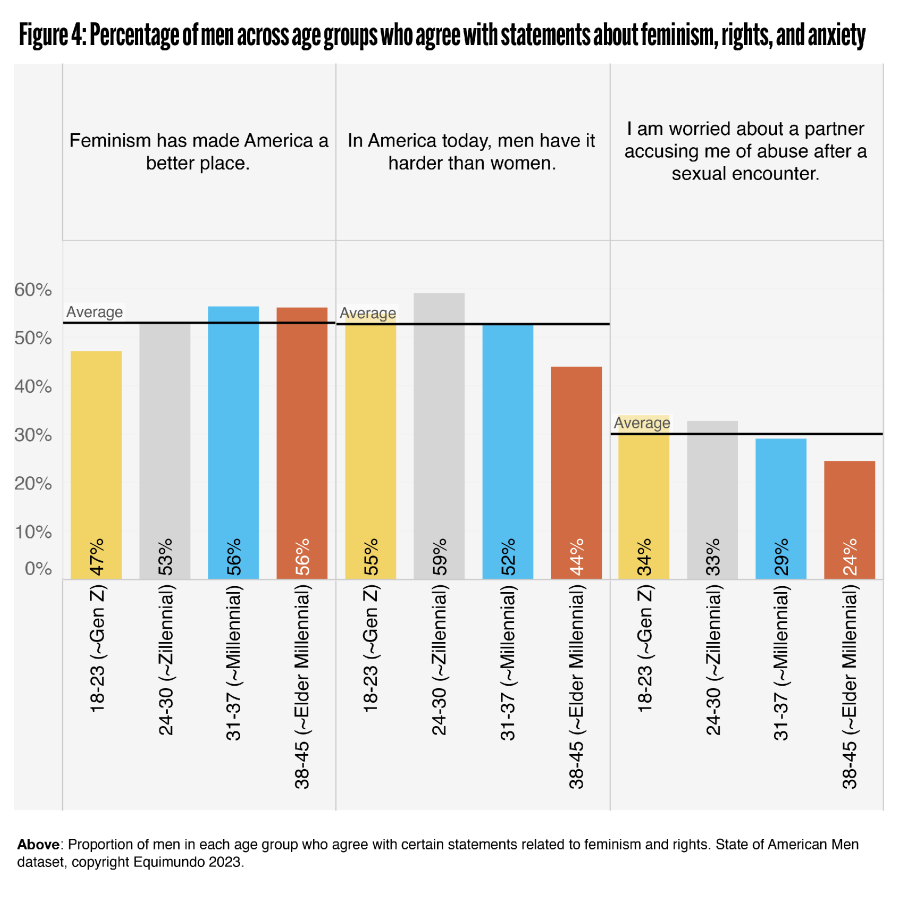
On the other hand, it found that they tended to be less likely to agree with ‘restrictive ideas about gender’ than Zillennials and Millennials, and about as likely to as Elder Millennials.
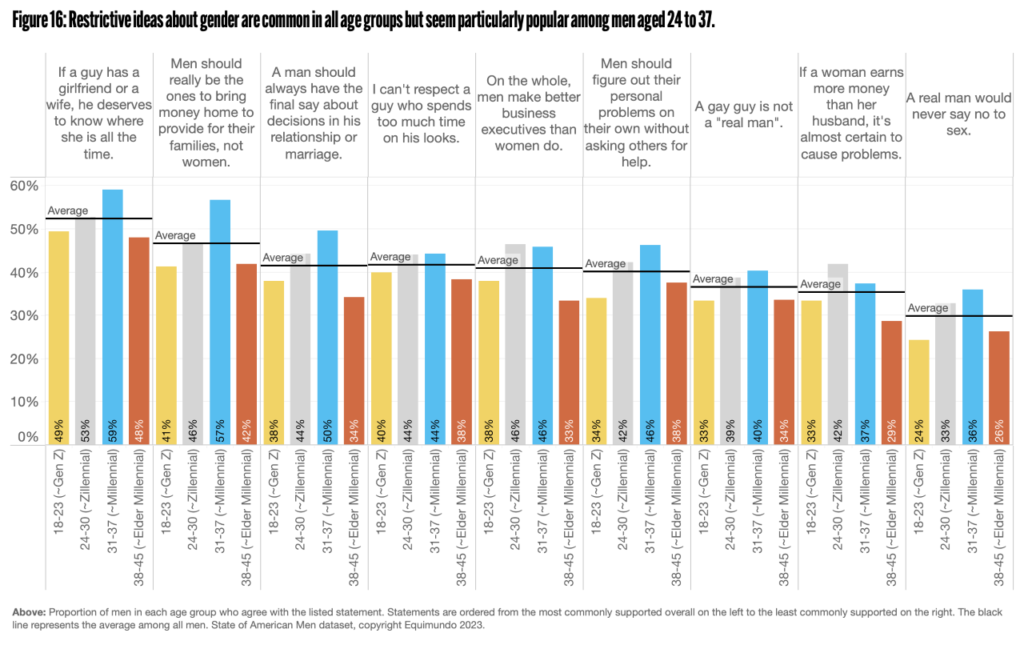
It also found that more Zoomers had ‘called out a friend for making a hurtful joke about women’, but also that the youngest men ‘trusted’ Andrew Tate the most at 20%, but this could partly be because they were more aware of him in general. They also found an interesting association which seems at odds with the notion that it’s the most hopeless and lost men who gravitate toward these ‘traditional masculine values’: “Most troubling is the finding that men who hold rigid, restrictive, harmful ideas about manhood report feeling the most purpose in life”.
A study by King’s College London’s Policy Institute had similarly mixed findings. While 29% of 16-29 males and 47% of 16-29 females thought that the term ‘toxic masculinity’ was helpful, representing the largest gender gap by age cohort, less 30-59 men (21%) and 60+ men (8%) believed it was.
26% of 16-29 males and 6% of 16-29 females said it was slightly or much harder to be a man than a woman, while slightly less 30-59 men (23%) and less 60+ men (17%) did. However, there were still more 16-29 males who said it was harder to be a woman (35%) than a man. This was less than 30-59 men (41%), but slightly less than 60+ men (32%). The gender gap was only noticeably smaller for 60+s.
21% of 16-29 males compared to 17% of 30-59 men and 13% of 60+ men stated that women have better lives today than men. Again though, more 16-29 males (32%) said women still had worse lives. This was slightly less than 30-59 men (37%) and 60+ men (39%).
30% of 16-29 males compared to 10% of 16-29 females said they thought it’d be harder to be a man than a woman in 20 years. This compares to 10% of 16-29 females, 25% of 30-59 men, and 22% of 60+ men. This time there were less who thought it would be harder to be a woman (23%). It’s also worth noting how more 16-29 females (48%) than 30-59 (38%) and 60+ (21%) women thought this. Interestingly, at the same time less 60+ men thought it would be harder to be a woman (12%). Basically older people thought there was less difference in general.
This one is very direct about asking whether feminism has done more good or harm to society. There actually wasn’t a significant difference between 16-29 males who said it had done more harm than good (16%) than 30-59 men (15%) or 60+ men (13%). There were however bigger differences in who said it had done more good than harm.
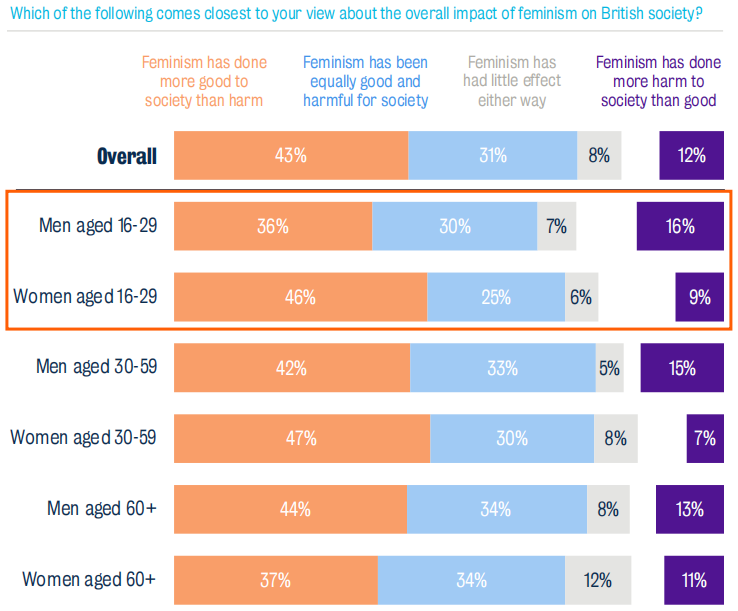
18% of 16-29 males and 20% of 30-59 men said that attempts to give equal opportunities have gone too far for women compared to 14% of 60+ men. There were no differences in the amount who said they hadn’t gone far enough (36-37%).
They were asked about their views on the Top G. 20% of 16-29 males said they had a somewhat or very favourable view of him, and 61% an unfavourable view. This compares to 7% and 76% of 30-59 men and 2% and 80% of 60+ men respectively. Interestingly, as many 16-29 females had a favourable view of him than 30-59 men. Therefore part of the effect may just be that younger generations who’ve grown up on the internet are less easily ‘triggered’ by such comical figures. Another thing to consider however is that ethnic minorities (19%) were far more likely than white people (4%) to have a favourable view of tate. The younger generation of course is constituted by a higher proportion of these minorities which may explain much of the effect.
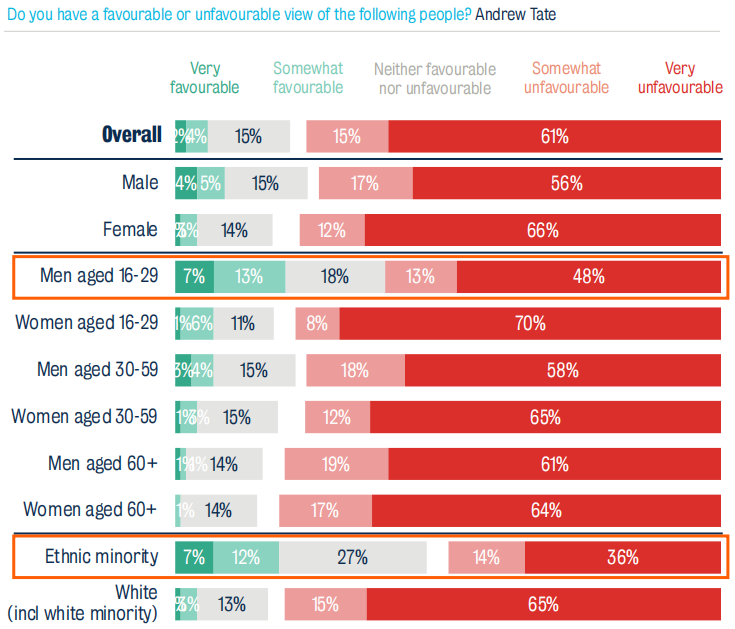
30% of 16-29 males agreed Andrew Tate raises a number of important points about real threats to male identity and gender roles, while 45% disagreed. 16% of 16-29 females and 18% of 30-59 men agreed. 56% of 16-29 males said they found his views on men and women offensive while 21% didn’t. 27% of 16-29 males thought the impact of his statements on society were positive while 57% thought they were negative. Again there were large ethnic differences in answers to these questions.
When it came to Jordan Peterson, there was little generational variation in support. 32% of 16-29 males, 26% of 30-59 men, and 31% of 60+ men had a favourable view of him, while 32%, 38%, and 23% had an unfavourable view.
Daniel Cox in an article in MSNBC writes: “Nearly 4 in 10 young men say women have an easier time than men getting ahead in American society today, and even more young men (45%) say there is at least some discrimination against men in American society. Roughly half as many young women believe this to be true, and even older men are less likely to agree”. Then there was the graph the FT author shared about younger men being a bit more likely to agree that women ‘seek to gain power by getting control over men’. The point I guess is that findings are somewhat mixed, probably because the effect is not extreme (yet).
The other countries
No doubt the first thing that pops out from the graph is the huge chasm opening up in South Korea. Like a lot of stats we’ve been presented with lately it gave me pause, compelling me to download the Korean GSS dataset and see for myself. I was able to replicate the gap when looking at political party support, but when instead looking at political orientation, young men were more liberal than conservative and the gap was about half that portrayed in FT graph. For men at least, we see a rise in centrist chads. In the most recent survey most young men described themselves as such.
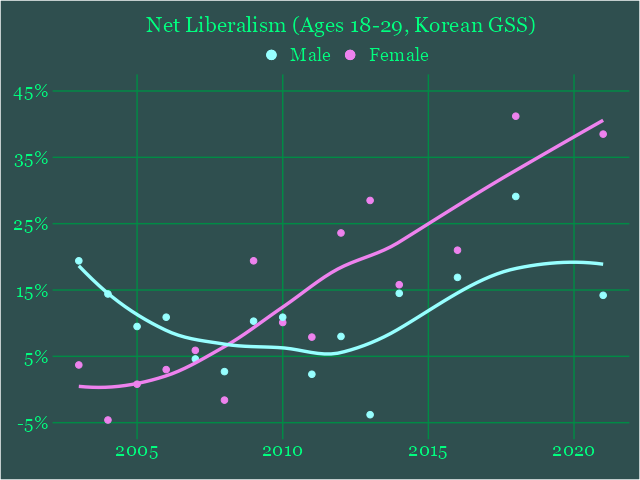
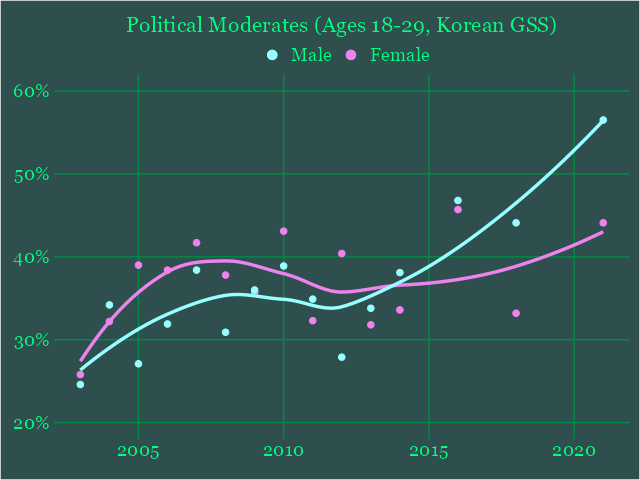
It’s worth mentioning that the sample size was only 27 for 18-29 men who gave a reply to the question on political party support other than those who selected none. 56 stated their political orientation, but only 24 of these were either liberal or conservative.
The election results voter breakdown shows a similarly large gap however, so this doesn’t seem to be the issue. The gaps also become far less noticeable in the older age brackets.
I also checked 18-39s for more reliable estimates and liberals still significantly outnumbered conservatives among men.
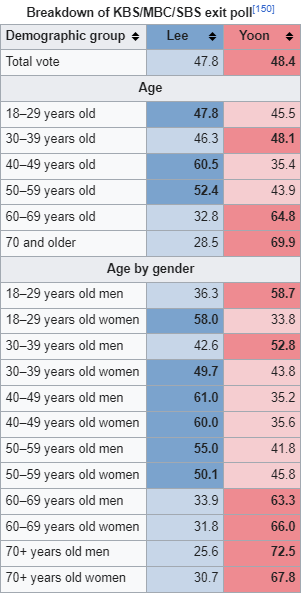
It’s possible that ‘liberal’ should be interpreted differently outside of a US context, as it’s often used in its more classical sense which advocates for individual liberties, private property, limited government, etc. This definition isn’t necessarily incompatible with ‘conservatism’. It seems like if liberalism and conservatism is being presented as a dichotomy however this is unlikely to be what it’s referring to, and while the answers in the English codebook use the term ‘liberal’, I translated the question in the Korean codebook and it actually came out as ‘progressive’.
It could be the case that despite being more progressive, they nonetheless feel aggrieved enough to support the party opposing feminism even if they don’t agree with many of its other policies. It may also be the case that moderates are on average going to still side more with the side that the majority of non-moderates of their gender side with.
There is tentative evidence for this in the dataset. Increasing the age range to 18-39 for more reliable estimates, 22.6% of male moderates supported the conservative party while 7.3% of supported the liberal one. 28.2% of female moderates supported the liberal party while 8.8% supported the conservative one. Also, while about 23.4% of liberal males supported the conservative party, almost no liberal women did. The amount of conservative men and women who supported the liberal party was similar, but more conservative men (78.7%) supported the conservative party than did women (42.5%).
I guess that surprisingly to me at least this is probably real. It also seems like it may also represent a genuine gender war. For instance, the conservative candidate vowed to abolish the Ministry of Gender Equality. Apparently men have a compulsory near two year military service which along with affirmative action puts men at a systemic disadvantage.
I also decided to download the 2021 German GSS. Again I found that young men were actually more left than right. When it comes to the political parties supported, 60.3% supported parties typically considered liberal, and 37.5% supported conservative parties. Only the Free Democratic Party, Christian Democratic Union and Alternative for Germany are typically considered conservative, although they also possess ‘liberal’ characteristics. The CDU has ‘liberal conservatism’ and the FDP simply ‘liberalism’ under ‘ideology’ on their wikipedia pages. Regardless, for men these parties add up to 30.5% while the others add up to 42.5%, with the greens being the most popular among both genders. If you excluded the people who refused to answer etc. and recalculated the percentages you might get a similar gap to the one on the chart, but both men and women would be more liberal. I guess due to the methodology used for the FT analysis if there was a population wide trend in liberalism it might’ve offset it.
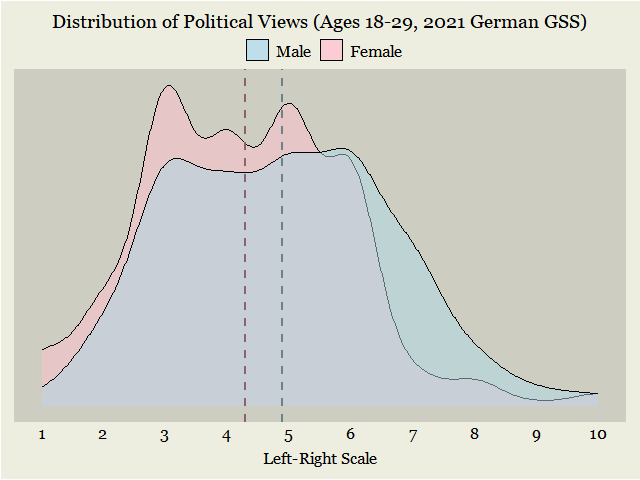
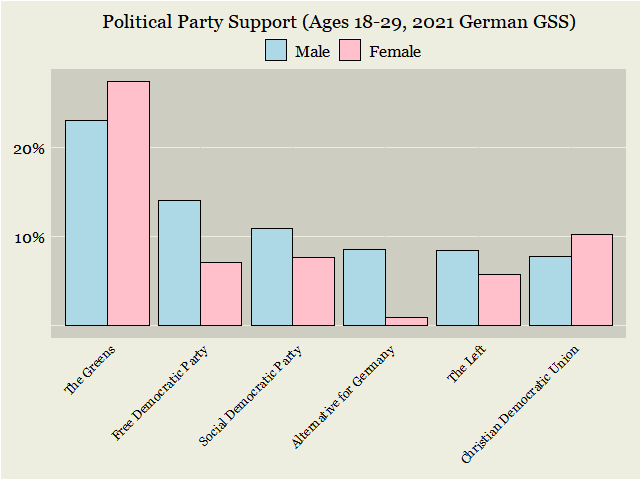
The FT article states that “The trend in most countries has been one of women shifting left while men stand still, but there are signs that young men are actively moving to the right in Germany, where today’s under-30s are more opposed to immigration than their elders, and have shifted towards the far-right AfD in recent years”.
However this appears to not entirely be the case going by the last election results. While they may have favoured them slightly more than did boomers, it was still the least popular party among under 25s and its largest constituency seems to actually be the middle-aged: “The Greens, FDP and the Left have similar problems. They all perform much better with younger than with older voters. The AfD underperforms in both categories and is mainly supported by middle-aged voters”.
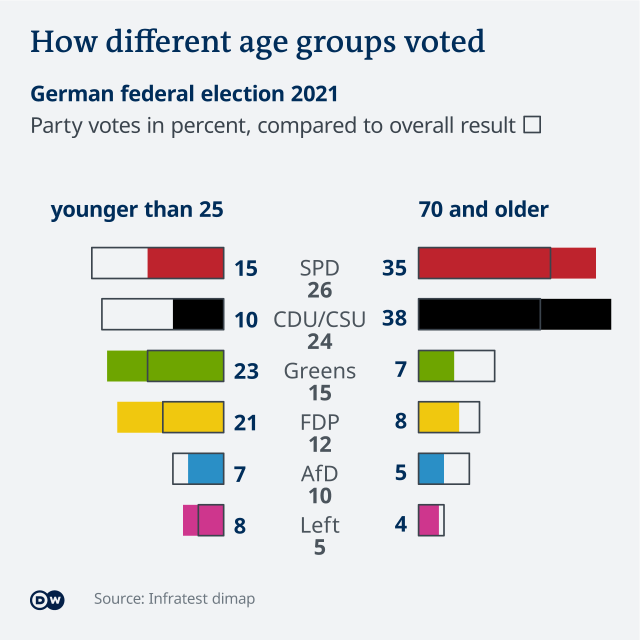
Since even on the graph it doesn’t show young British men moving right, I won’t bother looking further into that data.
Conclusion
With some exceptions, the polarization we see is less bidirectional and more driven by young women. In what’s likely the most reliable US source, young men were actually moving virtually in lockstep with young women. There was however evidence for a growing divergence in the youngest part of the 18-29 bracket.
It may be that young men aren’t especially politically engaged in general. In a survey by the Survey Center on American Life, young men weren’t significantly more concerned about any of the 15 issues listed. To be fair though, ‘sexism’ is generally used synonymously with ‘misogyny’, and there weren’t any issues that specifically pertained to men.
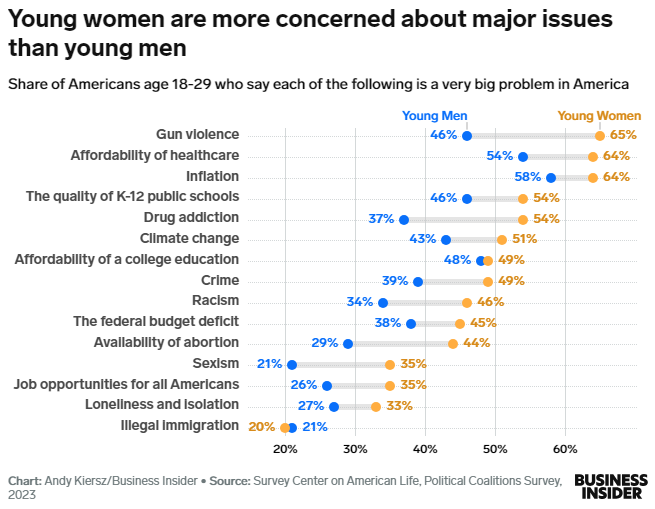
Why might this be? Some would say that men don’t feel as much of a stake in society anymore and are ‘checking out’. Maybe higher college attendance makes women more ‘activistic’. Some of it may be down to personality differences.
As to why women are getting more liberal? Again they’re attending college in higher numbers than men, and many decry college as little more than a woke indoctrination camp now, but there’s also the possibility of a selection effect whereby liberals are more inclined to attend them (even if it’s due to them being more liberal). The FT article linked it to the #MeToo movement . Others have pointed to the TDS effect. An ever present concern is the effect of social media bubbles. It might be difficult to explain how this would affect only women however. Maybe the right’s messaging is increasingly alienating to them while the left’s male-alienating messaging has perhaps passed its peak. Less women getting married may be a factor as often they’ve adopted the politics of their spouse. Instead it’ll be peers. You could argue that perhaps the reason we don’t (as consistently) see men moving left like women is that there is a countervailing force of right wing or manosphere influences creating a balance.
Regardless of the veracity of the data, the fact that so many were willing to immediately accept it without question is a problem. It feels like people were especially eager in this case as it reaffirmed their anxieties surrounding the pernicious effects of social media bubbles fostering radicalization. The way that men were almost exclusively focused on despite the more consistent and strong trend being driven by women is also quite telling. If there’s a way then people will always make everything about the ‘crisis of men’. Nothing is more sure to fire people up these days. I guess pussy hat rallies just aren’t seen as threatening enough to worry about compared to a fascist incel uprising.
Anyway that’s about it for now, I’m not sure how much I have to add when it comes to predictions or ‘solutions’, mostly just wanted to get this out of the way as I kept putting it off and now it’s kind of old news already. What we can say with confidence is that it likely won’t be getting easier to find that ‘virgin tradwife’ any time soon.
References
Burn-Murdoch, J. (2024). A new global gender divide is emerging. Financial Times. https://www.ft.com/content/29fd9b5c-2f35-41bf-9d4c-994db4e12998
Cox, D. (2024). The war within Gen Z. Business Insider. https://www.businessinsider.com/gen-z-gender-gap-young-men-women-dont-agree-politics-2024-1
Cox, D. (2024). Are Young Men Becoming Conservative? Survey Center on American Life. https://www.americansurveycenter.org/newsletter/are-young-men-becoming-conservative/
Saad, L. (2024). Democrats’ Identification as Liberal Now 54%, a New High. Gallup. https://news.gallup.com/poll/467888/democrats-identification-liberal-new-high.aspx
Cox, D., Hammond, K. E., Gray, K. (2023). Generation Z and the Transformation of American Adolescence: How Gen Z’s Formative Experiences Shape Its Politics, Priorities, and Future. Survey Center on American Life. https://www.americansurveycenter.org/research/generation-z-and-the-transformation-of-american-adolescence-how-gen-zs-formative-experiences-shape-its-politics-priorities-and-future/
Barker, G., Hayes, C, Heilman, B., & Reichert, M. (2023). The State of American Men: From crisis and confusion to hope. Washington, DC: Equimundo.
Campbell, R., Duffy, B., Gottfried, G., Hewlett, K, May, G., Skinnewr, G. (2024). Emerging tensions? How younger generations are dividing on masculinity and gender equality. The Policy Institute. https://www.kcl.ac.uk/policy-institute/assets/emerging-tensions.pdf
Hasselbach, C. (2021). Germany’s election results: Facts and figures. DW. https://www.dw.com/en/germanys-election-results-facts-and-figures/a-59343789
Ace of Base — шведская поп-группа, образованная в 1990 году. Их музыкальный стиль сочетает в себе элементы поп-музыки, дэнса и электроники. Группа стала популярной благодаря хитам “All That She Wants”, “The Sign”, “Don’t Turn Around” и “Beautiful Life”. Эти композиции не только покорили чарты во многих странах мира, но и остаются классикой жанра до сих пор. Ace of Base оставили неизгладимый след в истории поп-музыки, их мелодии до сих пор радуют слушателей по всему миру. Скачать музыку 2024 года и слушать онлайн бесплатно mp3.
I loved as much as you will receive carried out right here The sketch is tasteful your authored subject matter stylish nonetheless you command get got an edginess over that you wish be delivering the following unwell unquestionably come further formerly again as exactly the same nearly very often inside case you shield this hike
Excellent blog here Also your website loads up very fast What web host are you using Can I get your affiliate link to your host I wish my web site loaded up as quickly as yours lol
obviously like your website but you need to test the spelling on quite a few of your posts Several of them are rife with spelling problems and I to find it very troublesome to inform the reality on the other hand Ill certainly come back again
An interesting topic and I’m glad to come across your page where I found some helpful insights. Check out my website Webemail24 too, if you need additional resources about Gold and Silver.
더 도그 하우스 메가웨이즈
그는 입을 열었고, 마침내 공격적이어야 할 말을 다시 뱃속으로 삼켰다.
Simply wish to say your article is as amazing The clearness in your post is just nice and i could assume youre an expert on this subject Well with your permission let me to grab your feed to keep updated with forthcoming post Thanks a million and please carry on the gratifying work